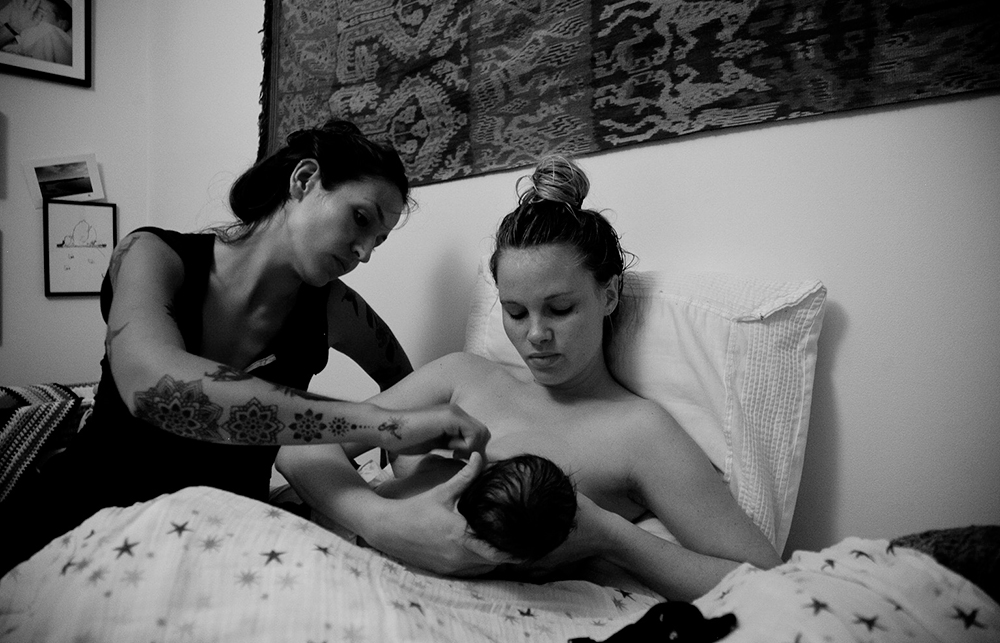
纽约由于受冠状病毒蔓延影响,当地医院采取了极端措施,限制访客进入,避免传播病毒。一些医院限制访客进入产房,哪怕是产妇的伴侣也不行。
纽约州州长安德鲁•库默周末对此做出干预,要求医院允许无症状的伴侣在产妇分娩时在场。但库默保留了另一项禁令:禁止导乐师等陪产的工作人员在场。
一些产妇会聘请导乐师陪产,她们是在分娩过程中提供指引和病人权益服务的非医疗专业人员。
“我们这个行业正在努力应对,”多米诺•柯克说,她是布鲁克林提供导乐师服务和培训项目的Carriage House Birth的联合创始人。
Carriage House Birth有约100名导乐师,她们的工作本质上是体力劳动。该组织的导乐师会和孕妇一起为可能的分娩场景做准备,在分娩过程中为她们提供权益服务,并在产后的“怀孕第四阶段”帮助她们解决母乳喂养或产后抑郁的问题。导乐师的收费标准从志愿服务到4000美元不等。11年前,柯克在儿子出生6个月后,成为了一名导乐师。
尽管有禁令,但许多孕妇认为导乐师的存在必不可少。这项工作也很难通过线上完成,已经为导乐师服务付过费的孕妇都很清楚这个现实。“有一种被遗弃和失落的感觉。”柯克说,“客户的情绪波动也很大。他们已经付过费了,或者本打算聘请导乐师,但却无法得到相应的服务。”
虽然导乐师不能陪客户去医院,导致她们无法正常开展工作,但柯克说,由于这场危机的严重程度显而易见,她和其他业内人士都预料到了会有这些限制令——“我们要宅在家里”——而她在是否解除这些限制的问题上也左右为难。“我们的工作是保护新生儿……这是一个数字游戏。房间里的人越多,房间里的人被感染的可能性就越大。”她说。
预产期临近的孕妇不得不应对不断改变的限制令,还要为大流行病对医院环境产生的影响忧心忡忡,导乐师组织正在做出调整。布鲁克林为有色人种和低收入女性提供服务的古歌导乐服务公司正在向有兴趣在导乐师无法在场的情况下为产妇提供病人权益服务的护士和专业医疗人士提供线上导乐培训。该组织创始人香奈儿•波奇亚•阿尔伯特指出,对有色人种而言,导乐师作为病人权益服务提供者的角色加倍重要,因为这些产妇出现并发症或死亡的风险更高。她指出:“存在因恐惧导致的胁迫和因为拒绝护理产生报复的风险。”各机构的导乐师都在和孕妇进行产前线上预约,并在临产时通过FaceTime连线。
以前家庭助产士一个月一般只接三到五个客户,现在因为有大量孕妇想要彻底改变分娩计划,她们需要应对询问量激增的现状。纽约的家庭助产士金姆•孙说,她现在一天接到的电话数已经超过了她往常每年接待的病人数量。她呼吁导乐师去做她们最擅长的事情:倡议。“她们可以站出来,确保卫生部、州政府和市政府尽量把相应的设备送到医院。如果她们这样做了,政府就很有可能不会采取[隔离女性]的政策,”孙说。
柯克自己也有六个月的身孕。她希望等到自己分娩的时候,纽约已经度过了疫情高峰,医院的规定能够更加宽松。“我一直在笑我自己,”她说,“也许我当了11年的导乐师,为的是有一天我能成为自己最好的导乐师。”(财富中文网)
译者:Agatha
纽约由于受冠状病毒蔓延影响,当地医院采取了极端措施,限制访客进入,避免传播病毒。一些医院限制访客进入产房,哪怕是产妇的伴侣也不行。
纽约州州长安德鲁•库默周末对此做出干预,要求医院允许无症状的伴侣在产妇分娩时在场。但库默保留了另一项禁令:禁止导乐师等陪产的工作人员在场。
一些产妇会聘请导乐师陪产,她们是在分娩过程中提供指引和病人权益服务的非医疗专业人员。
“我们这个行业正在努力应对,”多米诺•柯克说,她是布鲁克林提供导乐师服务和培训项目的Carriage House Birth的联合创始人。
Carriage House Birth有约100名导乐师,她们的工作本质上是体力劳动。该组织的导乐师会和孕妇一起为可能的分娩场景做准备,在分娩过程中为她们提供权益服务,并在产后的“怀孕第四阶段”帮助她们解决母乳喂养或产后抑郁的问题。导乐师的收费标准从志愿服务到4000美元不等。11年前,柯克在儿子出生6个月后,成为了一名导乐师。
尽管有禁令,但许多孕妇认为导乐师的存在必不可少。这项工作也很难通过线上完成,已经为导乐师服务付过费的孕妇都很清楚这个现实。“有一种被遗弃和失落的感觉。”柯克说,“客户的情绪波动也很大。他们已经付过费了,或者本打算聘请导乐师,但却无法得到相应的服务。”
虽然导乐师不能陪客户去医院,导致她们无法正常开展工作,但柯克说,由于这场危机的严重程度显而易见,她和其他业内人士都预料到了会有这些限制令——“我们要宅在家里”——而她在是否解除这些限制的问题上也左右为难。“我们的工作是保护新生儿……这是一个数字游戏。房间里的人越多,房间里的人被感染的可能性就越大。”她说。
预产期临近的孕妇不得不应对不断改变的限制令,还要为大流行病对医院环境产生的影响忧心忡忡,导乐师组织正在做出调整。布鲁克林为有色人种和低收入女性提供服务的古歌导乐服务公司正在向有兴趣在导乐师无法在场的情况下为产妇提供病人权益服务的护士和专业医疗人士提供线上导乐培训。该组织创始人香奈儿•波奇亚•阿尔伯特指出,对有色人种而言,导乐师作为病人权益服务提供者的角色加倍重要,因为这些产妇出现并发症或死亡的风险更高。她指出:“存在因恐惧导致的胁迫和因为拒绝护理产生报复的风险。”各机构的导乐师都在和孕妇进行产前线上预约,并在临产时通过FaceTime连线。
以前家庭助产士一个月一般只接三到五个客户,现在因为有大量孕妇想要彻底改变分娩计划,她们需要应对询问量激增的现状。纽约的家庭助产士金姆•孙说,她现在一天接到的电话数已经超过了她往常每年接待的病人数量。她呼吁导乐师去做她们最擅长的事情:倡议。“她们可以站出来,确保卫生部、州政府和市政府尽量把相应的设备送到医院。如果她们这样做了,政府就很有可能不会采取[隔离女性]的政策,”孙说。
柯克自己也有六个月的身孕。她希望等到自己分娩的时候,纽约已经度过了疫情高峰,医院的规定能够更加宽松。“我一直在笑我自己,”她说,“也许我当了11年的导乐师,为的是有一天我能成为自己最好的导乐师。”(财富中文网)
译者:Agatha
As the coronavirus spread throughout New York, hospitals took the extreme action of limiting visitors who could transmit the virus. Several placed limits on visitors to delivery rooms, including the partners of women in labor.
New York Gov. Andrew Cuomo stepped in this weekend, forcing hospitals to allow non-symptomatic partners to be present during delivery. But Cuomo left in place another ban: one on birth workers like doulas, the nonmedical professionals some women hire to act as guides and advocates through the birth process.
“We’re really grappling with it as a profession,” says Domino Kirke, cofounder of the Brooklyn-based doula collective and training program Carriage House Birth.
Carriage House Birth includes about 100 doulas, whose work is by nature physical. On a sliding scale of fees from volunteer up to $4,000, the collective’s doulas spend time with pregnant women preparing for possible birth scenarios, advocate for them during labor, and help with breastfeeding or postpartum depression in the “fourth trimester” after birth. Kirke became a doula 11 years ago, six months after the birth of her own son.
Despite the ban, it’s work that many pregnant women consider essential. And it’s also a profession that doesn’t easily translate to the virtual realm, a reality that women who have already paid for doula services are well aware of. “There’s a feeling of abandonment and loss,” Kirke says. “We’re letting people go through the roller coaster of emotions, that they won’t have the team they paid for or envisioned.”
While doulas’ inability to accompany their clients to the hospital compromises their ability to do their job, Kirke says she and others in the profession expected the restrictions as the extent of the crisis became clear—“we were hunkering down”—and she’s torn about lifting them. “As someone trying to protect newborns…it’s a numbers game. The more bodies in the room, the greater likelihood someone could walk out of there infected,” she says.
As women nearing their due dates contend with these ever-changing restrictions and worries about the pandemic’s effects on hospitals, doula organizations are adapting. Brooklyn’s Ancient Song Doula Services, which serves women of color and low-income women, is offering virtual doula training to nurses and health care professionals interested in filling the advocate role while doulas are unable to be present during births. Founder Chanel Porchia-Albert notes that the patient advocacy role played by doulas is doubly essential for women of color, who face a greater risk of complications or death. “There’s the risk of fear-based coercion, reprisal for refusal of care,” she notes. Doulas across organizations are doing virtual prenatal appointments and appearing on FaceTime during labor.
Home-birth midwives—who typically take only three to five clients a month—are dealing with an influx of inquiries from women looking to radically alter their birth plans. Kimm Sun, a New York home-birth midwife who says that the number of calls she’s gotten in a single day has now exceeded the number of patients she typically takes per year, urges doulas to do what they do best: advocate. “They can go out and do the work of making sure the Department of Health and the government and the city are trying to get equipment to the hospitals. If they do that, there’s a big chance they’re not going to have to put in the policy of [isolating women],” Sun says.
Kirke herself is six months pregnant. She’s hoping New York will have passed its peak in the virus crisis by the time she gives birth and that the rules at hospitals will be more relaxed. “I’ve been laughing to myself,” she says. “Maybe I’ve been a doula for 11 years so I can be the best doula to myself.”






